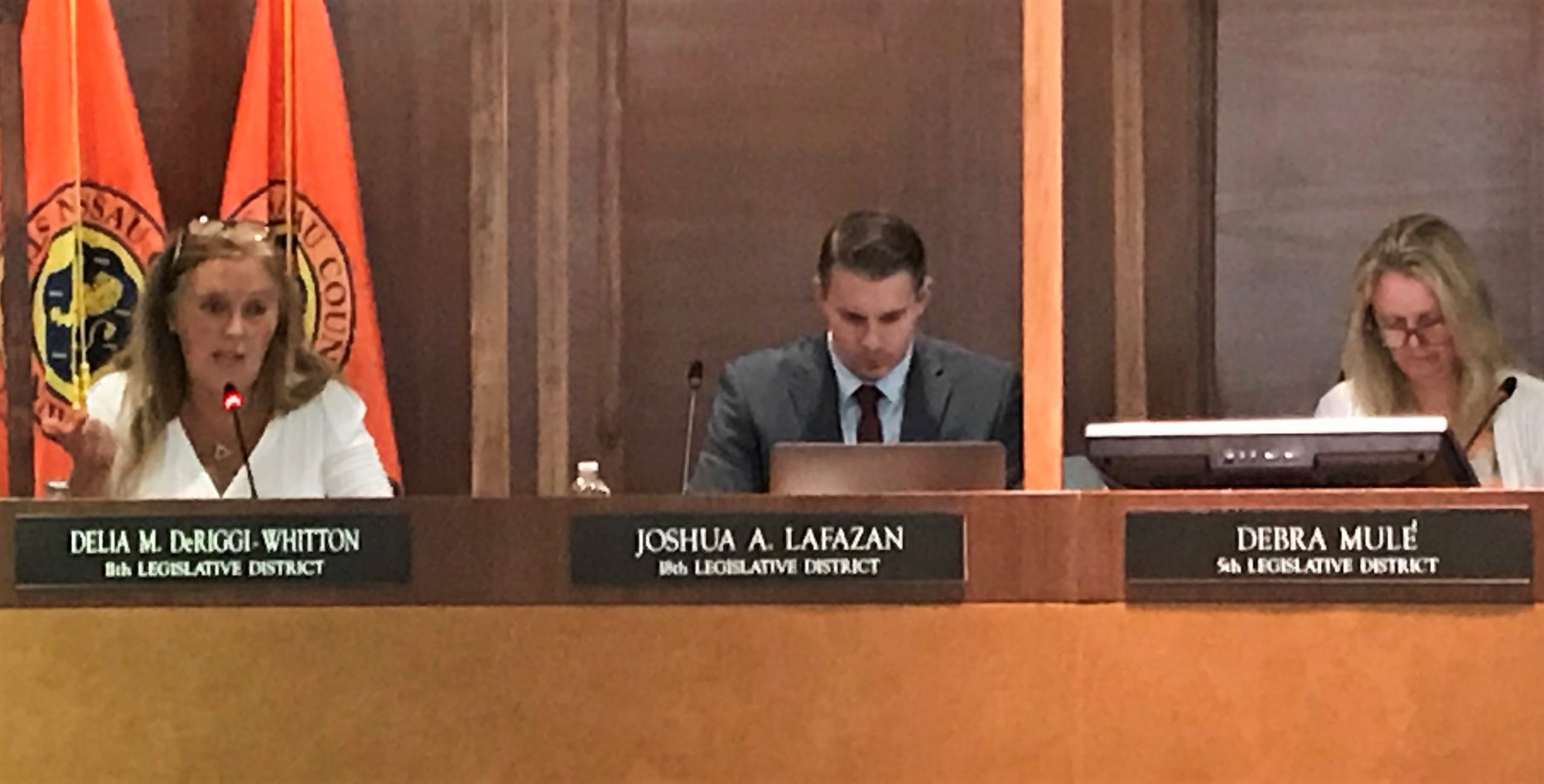Even as PSEG Long Island announced that it would reimburse customers who lost electricity during Tropical Storm Isaias for spoiled perishables, elected officials are still displeased with the company’s response and lack of communication during its aftermath.
The company, which estimates that some 420,000 customers lost power during or following the storm, announced on Monday that it would reimburse residential customers up to $250 and commercial customers up to $5,000 for food spoilage or medication expiration if their service was interrupted for 72 hours or longer between Aug. 4, and Aug. 12 due to the storm.
Residential customers will be asked to include an itemized list for food spoilage claims less than $150. Anything more than $150 must include an itemized list and proof of loss, which can include receipts, canceled checks or pictures of spoiled items.
For prescription medication that spoiled due to lack of refrigeration, customers must supply an itemized list and a proof of loss in the form of a prescription label or pharmacy receipt.
Commercial customers applying for reimbursement must supply an itemized list of spoiled food and proof of loss, including inventory lists and bank statements.
The company said that customers can apply for reimbursement online until Sept. 16, and that it will take up to 60 days to go through.
East Hills Mayor Michael Koblenz, who had advocated for reimbursement following the storm, expressed satisfaction in a statement.
“We are glad that our efforts, along with so many others, proved successful,” he said.
On the same day the company announced the reimbursement program, its leaders appeared before the Nassau County Legislature’s Superstorm Sandy committee in a hearing on the response to Isaias.
PSEG CEO Daniel Eichorn began his opening statement by acknowledging that the response “did not meet expectations.”
“Unfortunately, the Isaias restoration process did not meet our customers’ expectations, it didn’t meet your expectations, nor ours,” Eichorn said. “You are entitled to answers to your questions. What I would hope is that you could appreciate our singular focus has been restoring service to our customers. Now that that has been accomplished, we have turned our attention to getting answers to your questions – answers that PSEG-LI, LIPA and you can have confidence that these issues have been identified and addressed. It is in everyone’s best interest that we be given the opportunity to accomplish this now in a focused, methodical and comprehensive manner. Once we have the answers, we will provide them to you.”
Following Eichorn’s opening statement, he indicated that during the response, crews were working off models that didn’t reflect the actual situation.
“In this storm, what we found is when our crews were out working, instead of finding one damaged location to restore a neighborhood, it was multiple damage locations,” Eichorn said. “Those models that we were using proved to be much more optimistic than what our crews were seeing in this damage.”
Legislator Delia DeRiggi-Whitton, a Democrat representing the Glen Cove area, which was the hardest hit area on the North Shore, according to data from PSE&G, said “this was not the big storm we’re afraid of getting, and the reaction to it was much more difficult than we would expect.” She added that unlike Superstorm Sandy in 2012, the storm lasted three hours.
“There could be much worse coming, and we just feel the reaction to this one was extremely poor, especially after the anticipation of hearing we were anticipating this storm and we were ready for it,” DeRiggi-Whitton said.
“We spent millions and millions of dollars on tree trimming, we’re the third highest in the nation for our energy, our electric. It’s not only that we expect more, we’ve been told we should expect more, that we were going to be able to handle this type of thing. This is not a hurricane. It wasn’t close even to Superstorm Sandy.”
In the City of Glen Cove, 5,982 customers lost power, while 1,685 were affected in Sea Cliff, 645 in Glenwood Landing and 953 in Glen Head.
Legislator Joshua Lafazan (I-Syosset) then discussed the plight of residents at senior housing and how seniors were stranded in their units, sustained spoiled medicine and had no means of communication.
“Nothing seemed to happen until the media trucks showed up on Saturday,” Lafazan said, adding that the period from Tuesday to Saturday was “pretty concerning for seniors.”
Lafazan also asked when out-of-state crews arrived, were ready to begin work and enter the field, and why they couldn’t arrive earlier; about vulnerable customers that are not on the “critical customer” life-support equipment and how amending that list could be expedited, especially during the COVID-19 pandemic; about coordination with Verizon and 911 to preserve emergency response systems; about the state of PSEG-LI’s generator stockpile; and about backup generation for cell towers and geographic response strategies.
DeRiggi-Whitton said in a statement after the hearing that there was “still no excuse for PSEG-LI’s mismanagement of the response to Tropical Storm Isaias and its continued failure to communicate with local government officials and customers.”
“I am at least thankful that PSEG-LI relented to pressure from County Executive Curran and our state representatives and agreed to reimburse customers for food and prescription medicine that spoiled during extended power outages,” DeRiggi-Whitton said. “I can only hope that applying for relief is a more orderly, streamlined and user-friendly process than reporting power outages in the immediate aftermath of Tropical Storm Isaias.”



